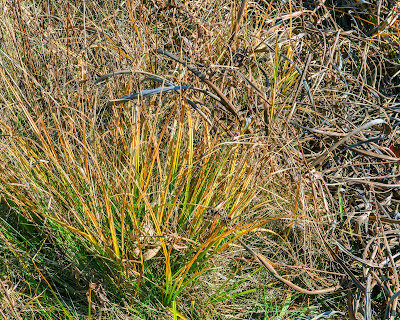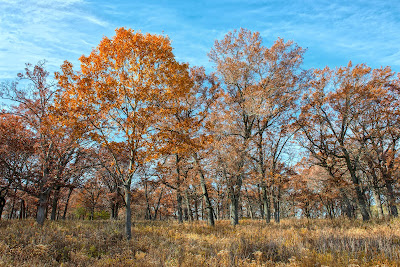Near the end of the last millennium, upon getting to the
bottom of the precipitous stairs and before setting foot on the bridge suspended over the Presque Isle River, I paused and surveyed the scene below. Folk's attention
was drawn to the riverbed. Of course, that drew mine.
It's a magnificent place, well beyond the methods and means of
humans to translate. Death's there too, make no mistake.
Below, two men crouched on a slate shelf hard to the swirling
current, about opposite where the much missed Dick from Wakefield fished. One man
was older and the other younger, though even he was older than me.
Together, the men offered sacred ceremony. They made no
effort to hide their love.
Roughly put, Presque Isle means almost island. The bridge over the river and the almost island beyond
fairly bustled with tourists that day. Some of them stopped to gawk. A mean
sliver of those chose to mock the Indians for being Indians at a place that nurtured them first.
They're called Native Americans for a reason. The few mouthy tourists made no effort to
hide their disdain.
I took a position on a high rock and sat very still. I love
my river. Anyone come to respect it in any way shape or form's all right by me.
Neither had I ever seen such a thing as those two men on any river, making me
just another tourist that day.
Later I learned the older man was a shaman and the younger
his traveling companion. They'd made the long trip from Canada to honor the river
of the old man's ancestors. As it happened, they invited me to walk the trail
with them, down to the big lake.
In the woods they spoke, I listened. They observed. I
realized how piss poor my vision is. At the lakeshore, we went separate ways
with well wishes all around.
At a placid pool that's occasionally a raging river but almost
always isn't (thus Presque Isle),
using a fallen branch I saved a white dragonfly from drowning. I set it on a
safe, warm place to dry.
Headed back to the bridge, I again crossed paths with the
two men. I asked the elder if he thought I'd been wrong, to intercede with death on behalf of the swamped dragonfly.
Should I have just let
nature take its course?
Not counting certain tourists, no one wants to be seen as
arrogant in front of an Ojibwa shaman.
Humans have done such terrible damage
to life, we now must do everything we can to help it, the shaman answered. Or words to that effect.
"Old rules no longer apply," he said. As long ago as the 2nd millennium, a wise old man said that to me.
For sure, I knew it was true before he said it. That's why I lifted the dragonfly from impending death, after all. But considering the source, it felt good to be let off the hook just the same.
During the high dry heat this past August, I came across a
cicada on my sidewalk. It stood motionless in the afternoon sun.
That was just a few feet away from where a couple weeks
prior, an adolescent robin landed when it fell dying from the sky. I stood over
the bird. It breathed. I hurriedly returned carrying a box lined with a
soft towel for creature comfort.
By then the young robin was dead. It felt like she didn't want me
to see her die.
I watched the cicada on the sidewalk for a while and decided
things just didn't look right with it. Usually when you pick up a cicada, the fierce
grip they take on your finger reminds you they spend most of their active lives
clinging to tree bark, through all sorts of weather. They're tough little buggers.
This cicada managed an abrupt squawk. Then it rolled over
onto its back in the palm of my hand and lay still.
Around here, sparrows gorge on cicadas. Typically, the
cicada screams bloody murder until the sparrow picks it down to the hard bits
that can't scream. I determined not leave this one laid out in the sun on my hot
concrete for some passing Velociraptor to claim.
After I set the cicada in one of our garden boxes where I
thought the birds wouldn't easily spot it, I periodically kept an eye on the
thing for an hour or so. It moved, a little. Just so much that I knew it still lived.
Then I looked out again and it was gone. If a sparrow found
and claimed him, so be it. If the cicada flew away and later that evening sang more cicada song, so much the better.
The inescapably dead robin lies a safe distance into the
earth beneath our garden. Above it, a transplanted sprig of Lamb's Ear has already
taken. Next year that should sprout a profusion of tiny purple flowers, upon which hungry bees
will feast.
The late great teacher and poet Patrick O'Neill wrote,
"Death is life."
He was right, of course. Yet as pithy and wonderful and absolutely
true though that line is, it's merely half the equation. And the utterly predictable half, at that.
Being human, the metaphysical
must be given at least equal weight. Or we aren't what we pretend to be, we never were,
there is no god and there never was.
Hell of a choice, right? But if we can't think our way
through it using the gifts we've been blessed with, we're no damned good to anyone.
Collectively, we must again learn to treat life – all life –
with surpassingly intuitive respect. Then we'll no longer be trapped into parsing the theoretical value of individual existence just so to justify killing it on the altar of some supposed common good.
It's okay to be a predator. Stupid predators don't last long.
"The old rules no longer apply."
In fact, here in the 21st Century they're demonstrably false and our hewing to them is aggressively ignorant. Terminally arrogant, even.
Truth is, it's new rules from here on and for the duration,
whether you like it or not. Two millennia of old world order and it's host of prior restrictions need no
longer apply. And science or the news or politicians or your social media feed needn't
prove it to anyone's satisfaction, either. There is but to
look.
In the end, it won't make a spit of difference if you greet death with equanimity or not. But embrace life while still a sentient part of it, then you
stand to make all the difference in the world.
We can help fuel life by individually working every day in
ways large and small for its collective future, or lie down and be fuel.
It's your choice. Whichever, there's no third way.
All life matters. Welcome to the 21st Century, finally begun in earnest...

































































